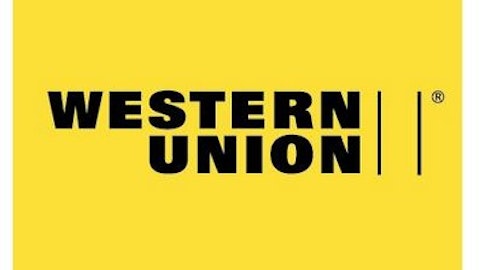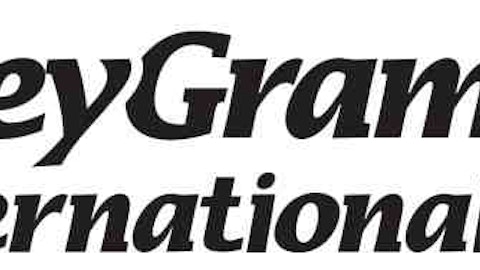
If you were an immigrant worker in the U.S., pricing would be a key consideration for selecting a money-transfer service. Xoom Corp (NASDAQ:XOOM) is a digital money-transfer provider, which enables its customers to send to families and friends through the Internet and offers lower transfer charges than its competitors.
Pricing matters for its customers
Xoom Corp (NASDAQ:XOOM)’s customer base is largely comprised of of immigrant workers in the U.S., with a bank account or credit card and access to Internet. The Philippines, Mexico and India accounted for close to three-quarters of Xoom Corp (NASDAQ:XOOM)’s fiscal 2012 revenue.
I believe that the cost effectiveness of transfer services is a key factor for foreign workers in their selection of money-transfer providers. A comparison of the difference in transfer charges between Xoom Corp (NASDAQ:XOOM)’s digital transfer and The Western Union Company (NYSE:WU)’s physical-agent based transfer will be useful in understanding Xoom’s price competitiveness vis-à-vis its peers.
For example, if one were to transfer $1,000 to the Philippines, it will cost a Xoom Corp (NASDAQ:XOOM) customer $4.99 to transfer money with his bank account, compared with a transfer charge of $12.00 for him to send money from a physical The Western Union Company (NYSE:WU) agent location. Alternatively, a transfer of $1,000 to the Philippines using a U.S.-based credit card or debit card will carry transfer charges of $9.99 and $24.99 for a Xoom customer and a The Western Union Company (NYSE:WU) customer, respectively.
It needs to be noted that The Western Union Company (NYSE:WU)’s digital money-transfer services are cheaper than Xoom Corp (NASDAQ:XOOM) in certain countries. This if one were to use a bank account for payment and have the ability to wait anytime between one and three days for cash pickup. However, Xoom’s advantage lies in the fact that it offers relatively faster disbursement, and more cash-pickup options, such as home delivery or direct bank deposit.
Superior margins indicative of cost advantage
Xoom delivered a gross margin of 66.5% for fiscal 2012, which is much higher than that of competitors Western Union and Moneygram International Inc (NASDAQ:MGI) , which delivered 2012 gross margins of 43.6% and 55.3%, respectively. In my opinion, Xoom enjoys an edge over its listed peers for a few reasons.
Firstly, Xoom originates all of its money transfers online, and does not have to pay commissions to physical originating agents accepting cash.
Secondly, it is estimated that bank accounts funded through the Automated Clearing House (ACH) system account for more than 90% of Xoom’s gross sending volume, with the remaining transfers funded by credit or debit cards. ACH transfers cost less on a per-transaction basis vis-à-vis other funding methods, and offer volume-based cost savings.
Last, but not least, Xoom is solely an online-services provider without the costs associated with physical locations.
Future outlook
Xoom achieved a good set of results for the first quarter of fiscal 2013, growing quarterly revenue and gross profit by 43% and 46% year-on-year to $24.3 million and $16.8 million, respectively. Management guided for full-year fiscal 2013 revenue to increase by 30% to between $104 and $106 million.
I am confident of Xoom meeting its targets as it expands its marketing partnerships and disbursement networks. In July, Easypagos, an international shipping company based in Ecuador, joined Xoom’s disbursement network, increasing Xoom’s cash pickup locations in Ecuador to over 1,000. In the Philippines, Xoom worked with its partners to provide free U.S. immigration law consultation for first time customers and cash bonuses for recipients.
Peer comparison
The Western Union Company (NYSE:WU) is the global market leader in money-transfer services. Unlike Xoom, which is solely focused on the consumer-to-consumer business, The Western Union Company (NYSE:WU) has a consumer-to-business segment. The consumer-to-business segment, providing bill payment services for mortgages and car loans, and its business-to-business segment, offering cross-border payment services for businesses, accounted for about 11% and 6%, respectively, of its fiscal 2012 revenue.
These two business segments are much more economically sensitive than its bread-and-butter consumer-to-consumer transfer services. Another issue with Western Union is its high financial risk, with a gearing of 406%. In contrast, Xoom and Moneygram International Inc (NASDAQ:MGI) have net-cash financial positions. Going forward, management guided for a low single-digit decline in full-year 2013 revenue on the back of weak transaction growth and pricing cuts.
Moneygram International Inc (NASDAQ:MGI) is Western Union’s closest competitor, as the second-largest money transfer company in the world. Moneygram International Inc (NASDAQ:MGI) grew its quarterly money transfer revenue and transaction volume by 10% and 11%, respectively, for the first quarter of fiscal 2013. Management estimated fiscal 2013 year-on-year revenue growth to be in the range of 6% to 9%. However, Moneygram International Inc (NASDAQ:MGI) has an inferior agent network in terms of the number of physical locations and a lower volume of customer dollars processed, compared with Western Union. This suggests that Moneygram International Inc (NASDAQ:MGI) has a weaker network effect than Western Union, as its agents earn less commission with a lower transaction volume and its customers have access to fewer locations to transfer cash.
However, disruptors like Xoom are expected to take more market share from traditional money-transfer providers as more people get comfortable with online money transfers and either open a bank account or apply for a credit card.
Conclusion
Xoom is my preferred money transfer provider of choice as an investment candidate for its attractive pricing and cost efficiency. While Xoom is valued at a premium to its peers with an enterprise value/revenue of 8.8, I think this is justified given its superior growth prospects.
The article This Company’s Affordable Services Bring a Smile to Investors originally appeared on Fool.com is written by Mark Lin.
Mark Lin has no position in any stocks mentioned. The Motley Fool recommends Western Union. Mark is a member of The Motley Fool Blog Network — entries represent the personal opinion of the blogger and are not formally edited.
Copyright © 1995 – 2013 The Motley Fool, LLC. All rights reserved. The Motley Fool has a disclosure policy.


